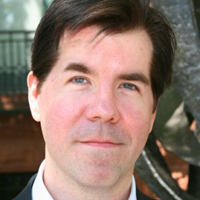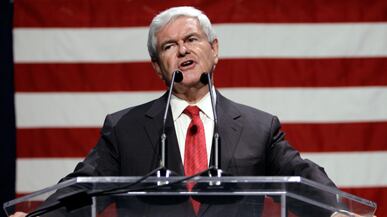Newt Gingrich is probably the brightest, most intellectually curious person seeking the Republican presidential nomination this year. Faint praise, I know, yet still true. So why is he going out of his way to screw it up?

In recent days, the former speaker of the House has offered what might charitably be called an incoherent position on the situation in Libya. First, he said that President Obama needed to institute a no-fly zone. Then, he criticized Obama when he announced plans to do just that. Only hours later, he said he would not have intervened at all. Mr. Gingrich understands how damaging this remarkable political pirouette is for a man auditioning to be America's steady and certain commander-in-chief, and has been working hard to explain his position. But it is likely too late. His candidacy has been badly damaged because he has proven his many critics right.
A longtime Republican leader once told me that Newt will offer the leadership 10 new ideas a day: Three of them will be brilliant, four of them will be impractical, and the other three will be breathtakingly nuts. But at least, I thought, Newt has ideas. Surely such a bright man—he has written numerous articles and books, including novels on the civil war, and organized a vast and impressive political machine—must have known what reporters and assorted pundits in Washington were going to say about his presidential campaign, and him. That he is undisciplined, unable to focus, unwilling to manage a campaign or himself. He must have known they would be on the lookout for gaffes, missteps, any sign that his campaign was in disarray. Yet that is exactly what the speaker has given them.
Newt doesn't want to be managed or controlled. He does not want focus groups to tell him how to cut his hair or where to vacation. And in the end he may suspect what others know to be true: He really doesn't want to be president.
It is not, sadly, just Libya. One day a senior aide announces the imminent formation of an exploratory committee. Then the next day another senior aide—who seems not to like the first senior aide—says that isn't true. Meanwhile the man who was seen by many Republicans as having undermined their majority in Congress in the 1990s by pursuing the impeachment of Bill Clinton—failing to even get a majority of the Republican-controlled Senate of board—decides it might be a good idea to discuss impeaching Barack Obama.
Is this really the discussion that Mr. Gingrich thinks the country wants to have right now? The sobering answer is that he probably doesn't; the words seem to have left his mouth before his brain had given the sign off.
These are among the reasons why the former speaker is not taken all that seriously as a presidential contender. He has the look of another Rudy Giuliani—a man with high name recognition, who initially polls well, but who will not do the hard, plodding work of being a successful candidate in the 21st century media age. Say what you will about the pizzazz-deprived Romney campaign. But there is no way that Governor Rombot would have unleashed an answer on impeachment or Libya or anything else for that matter without first making sure it had been vetted with aides, tossed around with a dozen advisers, PowerPointed three times, put on two sets of 3 X 5 index cards, and then tested before carefully arranged focus groups matching all the desired demographics across 10 swing states.
Newt doesn't want this. He doesn't want to be managed or controlled. He does not want focus groups to tell him how to cut his hair or where to vacation. And in the end he may suspect what others know to be true: He really doesn't want to be president. It is too confining of a job.
Maybe Mr. Gingrich is not well suited to the modern presidency. In any case there is something sad about this. Among all the leaders of the current Republican Party, Mr. Gingrich has proven himself a most worthy warrior. It was Mr. Gingrich, after all, who choreographed the Republican tsunami of 1994, when most of the party establishment seemed content to languish in a 40-years-long minority. The incoming speaker was considered so powerful, so influential, that Bill Clinton had to plead to reporters that he was still “relevant” and then started to steal some of Newt's ideas. Since resigning as speaker amid controversy, he had struggled to appear as a serious person with serious ideas. Gingrich has shown himself unafraid to challenge GOP orthodoxies, to experiment with different approaches to festering problems, to drive an agenda of political reform and good governance. Though it would earn him lasting enmity, he met with then-Senator Hillary Clinton on health care and did a commercial with Nancy Pelosi about greenhouse gases. The point is not that Mr. Gingrich's approach was correct—in full disclosure I was among those who criticized him—but perhaps there is something noble about the effort to try to find some common ground. Perhaps, but it will still doom him.
There was a time when presidential aspirants could hold evolving viewpoints—Lincoln, for example, both opposed the institution of slavery and promised the South that he wouldn't touch it if elected; FDR's New Deal was in many ways a try-something-to-see-if-it works experiment. But the country will no longer tolerate this in a presidential candidate. The voters do not want intellectual curiosity, the media will pounce on a flexibility of viewpoints, the punditry will decry a candidate who experiments with ideas out loud. Just as the media decided Fred Thompson was lazy in 2008, and decided to prove it with everything he did or didn't do, there will be a manhunt under way from now on for everything the Gingrich campaign does to show its inefficient operation: a missed comma in a press release, a canceled press event, the most minor reversal on a previous position. It is easy to take shots at someone like Newt; I've done it.
These days we prefer the Rombot. We are more comfortable with him—one who has a fixed view of the world with cookie-cutter policies, who says all the correct things on CNN or Fox News, who never commits a gaffe in public, whose hair is well coifed, who hits his lines perfectly, who knows where to stand in front of the TV camera, who pays homage to Ronald Reagan and Barry Goldwater without really understanding them. That is who we seek—that is who we are told to seek. And we are likely to get him.
Matt Latimer is the author of the New York Times bestseller, SPEECH-LESS: Tales of a White House Survivor. He was deputy director of speechwriting for George W. Bush and chief speechwriter for Donald Rumsfeld.





